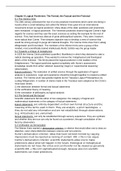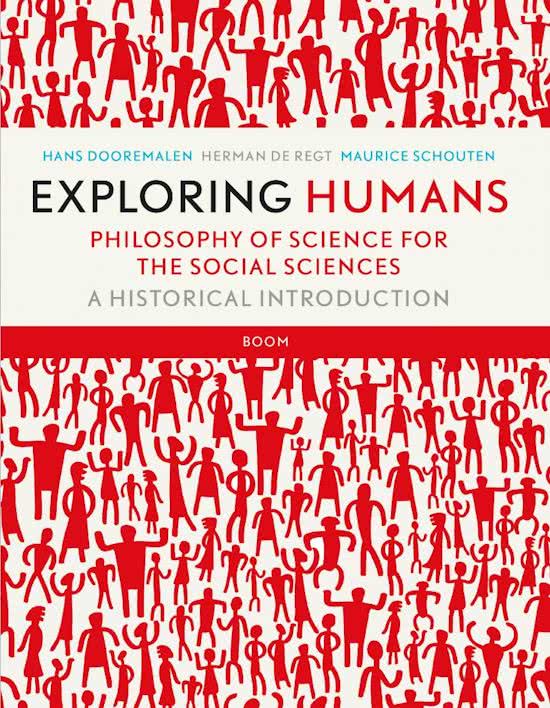Chapter 6 Logical Positivism: The Formal, the Factual and the Fictional
6.1 The Vienna circle
The 20th century witnessed the rise of a new positivist movements which came into being in
Austria when a small debating club called the Wiener Kreis grew into an international
movements known as logical positivism. Many ideas of the older positivists and empiricists
were revitalized in logical positivism. The Viennese positivists shared Auguste Comte’s high
regards for science and they saw the exact sciences as setting the example for the rest of
science. They had enormous distrust of great philosophical systems. They were, however,
more radical than Comte. Their deepest objective was to develop a view of science that
would be strong enough to purge all irrational thoughts. The Vienna Circle drew from Ludwig
Wittgenstein and Ernst Mach. The members of the Wiener Kreis were a group of like-
minded, most scientifically trained intellectuals.Mortiz Schlick was the group leader.
6.2 Towards a critique of metaphysics
In 1929 the Vienna Circle published a pamflet ( Manifesto) in which they declared to start a
radical cleaning-up operation. They wanted to remove the ‘metaphysical and theological
debris of the milennia’. This firmly placed the logical positivism in the tradition of the
Enlightenment. The logical positivists agreed completely with Hume’s assessment:
knowledge results from either ‘abstract reasoning’ (logic) or ‘experimental reasoning’
(observation).
logical positivism: The realization of unified science through the application of logical
analysis to experience. Logic and experience should be brought together to created a unified
science. The Vienna circle was greatly inspired by the Tractatus Logico-Philosophicus by
Ludwig Wittgenstein. A number of claims made in the Tractatus were adopted as the Circle’s
most basic tenets.
1) the distinction between formal and factual statements
2) the verification theory of meaning
3) the conception of philosophy as logical analysis
6.3 The formal and the factual
Scientific statements fall into either of two categories: the category of logical and
mathematical statements or the category of factual statements.
logical statements: are entirely dependent on their own formal structure and the
meaning of the terms used in them. They are analytic, a priori tautologies. →
they do not add any information and are not established through observations.
(e.g. All bachelors are unmarried)
factual statements: can only be established through sensory experience. They are synthetic
and whether they are true can only be found out a posteriori, through consultation of the
facts by observation.
6.4 Verification as Demarcation
The Wiener Kreis wanted a demarcation criterion: a criterion that would allow one to draw an
objective, razor-sharp distinction between science and non-science.
Hume’s demarcation criterion: ideas that have not been formed by copying
impressions must be rejected as lacking of content. WK → this is too vague
Comte’s demarcation criterion: scientifc statements allow one to make
predictions about what will happen in the future, theological or metaphysical
statements do not have this virtue and can therefor not be viewed as genuinely
scientifc.WK → this isn’t sophisticated enough, because also non scientifc
statements can make predictions.
,WK demarcation ( inspired by Wittgenstein): the meaning of a statement is determined by its
method of verification. If a statement can not be empirically verified, it is meaningless. Basic
(theoretical) statements must be defined in observable reality.
With their verification criterion in hand, the neopositivists were able to tell meaningful
statements apart from meaningless ones.
Verification thus functions as a criterion of cognitive significance.
6.5 A new job description for philosophers
logic positivists: we can only formulate meaningful synthetic statements (i.e statements
about the world) by using a posteriori resources: sight, hearing, smell, touch, or taste.
Synthetic a priori statements do not exist. They are devoid of content and should therefore
be banished from science.
BUT: philosophers have always dealt with statements that are both synthetic and a priori.
LP → Philosophical problems are either empirical problems and should be left to
science or they are pseudo-problems.
The philosophers can still play an important role in science. Philosophers should investigate
and clarify the logical aspects of the language used by scientists. Philosophy must concern
itself with logical analysis. They should search for and eliminate misunderstandings resulting
from violations of logic and the use of unclear expressions.
Philosophers should transform prepositions by means of definitions until terms are obtained
that no longer can be defined but can be brought into immediate contact with experience.
6.6 Wittgenstein revisited
Although the Wiener Kreis was greatly inspired by Wittgenstein, there were certain things
that could not agree on. Although Wittgenstein had argued that metaphysical statements are
without content, he was not as dismissive of them as the members of the circle were.
Wittgenstein did not share the WK’s enthusiasm for science.
Wittgenstein had also argues that there are things that are outside the use of language and
hence of science. ‘’There are, indeed, things that cannot be spoken of, since they cannot be
expressed in language. They make themselves manifest. They are what is mystical.’’
Wittgenstein’s relationship with the WK members were soon to become troubled.
6.7 A phenomenal basis for science
What Wittgenstein did not make clear was what it means to say that a statement can be
brought into immediate contact with reality. It is here that Ernst Mach comes to the rescue.
Mach: To reach certainty, we should go back to what cannot be doubted. All
scientifc statements must ultimately refer back to sensory phenomena; if they
do not, they should be considered inadmissible. ( → Mach thus revived Hume’s
Copy principle)
The sense data are described in basic sentences that were referred to as protocol
sentences. They are direct reports of simple experiences.
Protocol statements are immediately verified.
Observation statements that refer directly to experience are absolutely certain.
The principal task for scientists (and their philosophical assistants) is to tie theoretical
statements ( about dental caries, Down Syndrom etc) as closely as possible to protocol
statements about sensory experiences.
→ Science should have a phenomenal basis.
Not everyone was convinced, cracks began to appear in the Kreis.
6.8 Physicalism
The problem that arises with the protocol sense debate is the following:
,The statements about my sense data, are certainly true for me but this does not mean
that it is objectively true. E.G: ‘’The paper that lies on the table is green’ → I see
this as green, but maybe someone else doesn’t. This makes it a subjective
verifcation but we want an intersubjective verifcation in science: → ALL
observers must agree that it is green.
This is impossible because we cannot compare our sense data to someone else’s. Maybe
my neighbor is colorblind and has the color experience of what I would call red, but had been
taught to name that color green.
Verification thus turns out not to be an objective process; it takes place in the exclusive
privacy of one’s own mind.
6.9 A Physicalist basis for science
Within the Vienna Circle, two wings emerged: The conservative right wing of
Schlick and Waismann who remained faithful to Mach and Wittgenstein →
knowledge rests on indubitable basic statements describing experiences.
The left wing of Neurath and Carnap who denied that such indubitable statements were
possible.
Neurath: the language of science must be intersubjective and this implies that it cannot be
based on a subjective language.
The phenomenal language was constructed in subjective form, with I, now, here
as central terms( → I now see here red).
Nauraths physical language used an objective form and the concept of perception ( At 10:20
A.M John observed that the pointer’s needle indicated 3.5) The physical language does not
talk about sense data, but about the observable properties of material objects.
physicalism: the basis of science is not constituted by what each of us sees with his or her
mind’s eye ( mental objects) but with his or her bodily eyes(physical objects). This
supposedly guaranteed intersubjectivity.
The thought that we can compare our statements to reality in order to figure out whether
they are true or not, must be condemned as metaphysical. Statements can only be
compared, investigated and coordinated with each other.
Truth then does not consist in the agreement of statements and facts (correspondence) but
in the agreement of statements with other statements (coherence).
It is not because of their great fit with absolutely true observational data that scientific
theories are kept alive. It is only because theories and statements hold each other in place
that they survive ( and only for the time being).
This can lead to relativism: Anything goes, as long as it’s coherent
6.10 Unified science
The LP’s attack the hermeneutics view: by intuition and contemplation we can obtain no
knowledge whatsoever, so that it is not only no method for a rigorous science, but not even a
scientific method at all.
LP: There is only one science, with one method and one language of science
Neurath and Carnap: the universal language of science should be the physical language.
Because all sciences could be translated into the physical science, they could all be united,
at least in principle.
6.11 Conclusion
physicalism had obvious advantages over phenomenalism: it seemed to make
communication, cooperation and unification possibly.
However: physicalism also suffered from major weaknesses:
, -physicalism had given up on certainty and truth
- any coherent story will qualify as science
-astrology and physics are equally scientific
Vienna based positivism leaves us with 2 choices:
1) Certainty but no intersubjectivity
2) Intersubjectivity but no certainty
Chapter 7, Critical Rationalism: Science on Piles, Above a Swamp
7.2 Popper and the Weiner Kreis
Agreed with positivists: On the importance of logic and Mathematics for science and he
appreciated their emphasis on empirical testing.
Disagreed with positivists: There is also a rational aspect to knowledge and science and this
rational aspect Popper considered of fundamental importance.
Popper: Theory always comes before, not after observation.
Poppers views must be distinguished from the views held by Plato, Descartes and Kant.
Popper was a critical rationalist.
7.3 The crucial year 1919
7.3.1 Popper’s clash with Marxism
Popper learned 2 lessons from his encounter with Marxism :
1) Humans are liable to make mistakes, human beings are fallible creatures
2) There is a major difference between dogmatic theories( Marxist theory) and critical
thinking.
7.3.2 Popper meets Alfred Adler
The experiences with Marxism and Adler’s psychology led him to seriously question the
scientific value of theories that are able to explain every possible observation.
Such virtually unlimited explanatory power was, not a strength but instead a sign of the
profoundly unscientific character of such theories.
7.3.3 Popper and the bending of light
Popper: A theory can not be scientific when it is always true, no matter what happens.
7.4 From Verifciation, via Confermation to Falsification
Popper’s struggle: How to draw a boundary around science and set it apart from non-
science?
critique on logical positivism: if we adopt the criterion of verification, the implication is that
some of the best scientific achievements no longer deserve to be called scientific.
Popper: positivists, in their anxiety to annihilate metaphysics, annihilate natural science
along with it.For scientific laws, too cannot be logically reduced to elementary statements of
experience. ( Agreement with Hume). Instead of eradicating metaphysics from the empirical
sciences, positivism leads to the invasion of metaphysics into the scientific realm.
Schlick: response to induction problem: Universal laws are neither true or false, they are
mere instruments that can be used to infer statements about particular events.
Carnap: agreed (in response to popper) that the original verifiability criterion has to be
considered oversimplified. It leads to a too narrow restriction of scientific language, excluding
not only metaphysical sentences but also certain scientific sentences having factual
meaning. Carnap however proposed a modification of the verification principle:






